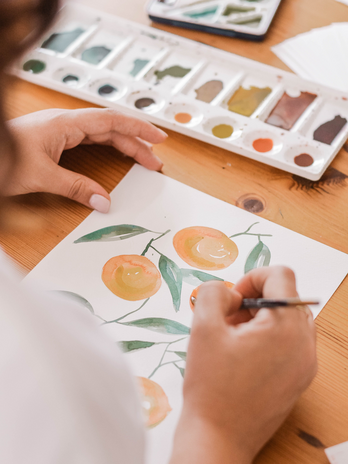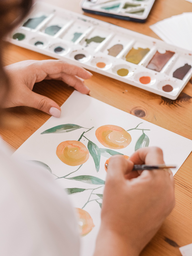With winter getting colder, little to no sunshine, and shorter days, productivity levels are at an all-time low, and seasonal depression levels continue to rise. Being creative can be a struggle during times like this. Maybe you want to paint that artwork or write that poem that has been on your mind for a week–but man, you just don’t feel like it. Or maybe, you got your art supplies together only to find yourself staring at them with a blank stare accompanied by a lack of motivation and inspiration. This is what’s known as a creativity block. Creative blocks, also known as barriers to inspiration, is described as the inability to access your internal creativity. Writers, musicians, performers, and artists often experience creative blocks, which can last for days, weeks, months, or even years! Creative blocks can be frustrating, but it’s important to note that it is completely normal to go through this. With the right self-care and understanding, anyone can overcome creative blocks. Here are some tips on how to tap into your creativity again!
- Give Yourself a Break
-
Understand that it’s okay to be not creative and inspired all the time, so try not to be too hard on yourself. Usually, people experience creativity blocks when they have a lot going on in their lives, such as anxiety, depression, or stress. Notice where your attention seems to be and see if you can figure out why you are experiencing a lack of creativity. Practicing self-awareness will allow you to observe the things in your life that may be obstacles to your success. Maybe you just need a netflix break or you need time to sort through an issue you’re going through.
- Carry a Notepad
-
Have you ever been minding your own business when suddenly, a random idea comes to mind? It may be a profound quote, realization, or a sudden epiphany about life. Regardless of what it is, write it down! Capture those ideas and creative moments to reference later before they disappear into the busy state of your mind. Carrying a notebook will ensure you can always jot down any creative ideas that come to mind.
- Practice Self-Care
-
This goes with the first step. As cheesy and cliché as it sounds, take time for yourself and care of your needs. If you have something going on in your life that is taking up all your attention, address and work through it. Don’t force yourself to be creative if you don’t feel like it. The best art, writing, and other forms of creativity come naturally when you truly feel inspired to create. When you force yourself to be creative when you aren’t in a creative mood, it may be difficult to complete the task. For example, I made a promise to paint a picture a day. Three days in, however, I completely lost my motivation due to stress from being a senior in the middle of a global pandemic and schoolwork. When I forced myself to paint that picture, I ended up stopping halfway through because I just wasn’t feeling it. Listen to your body! If you don’t feel like doing something, take a gentle step back and address your needs.
- Set a Routine!
-
Dedicate time for creativity. If you have a stressful day at work or school, set up a routine where you are able to unwind with some tea, your favorite food, and put your phone away. Put on some music and ease yourself into writing that blog entry, or sketching that drawing. This will give you time to focus on de-stressing through your creative side. Now would also be a great time to reference that notebook from step two!
- Take a Walk
-
I don’t know if it’s just me, but when I go for walks, my thoughts flow so easily and freely. As the wise philosopher David Thoreau once said, “The moment my legs begin to move, my thoughts begin to flow.”
- Switch It Up
-
Maybe you’re stuck in your room because of quarantine, or you just need a change of scenery. If the weather is permitting, do some art outside! You can also redecorate your room, or move furniture around. You can also go to the library or a coffee shop for a change of scenery. Sometimes our brains need something that’s not too familiar to be able to process our thoughts better.
Remember, it’s okay not to be productive every day. Just be mindful and address your needs as needed. Take a step back and take care of yourself!


